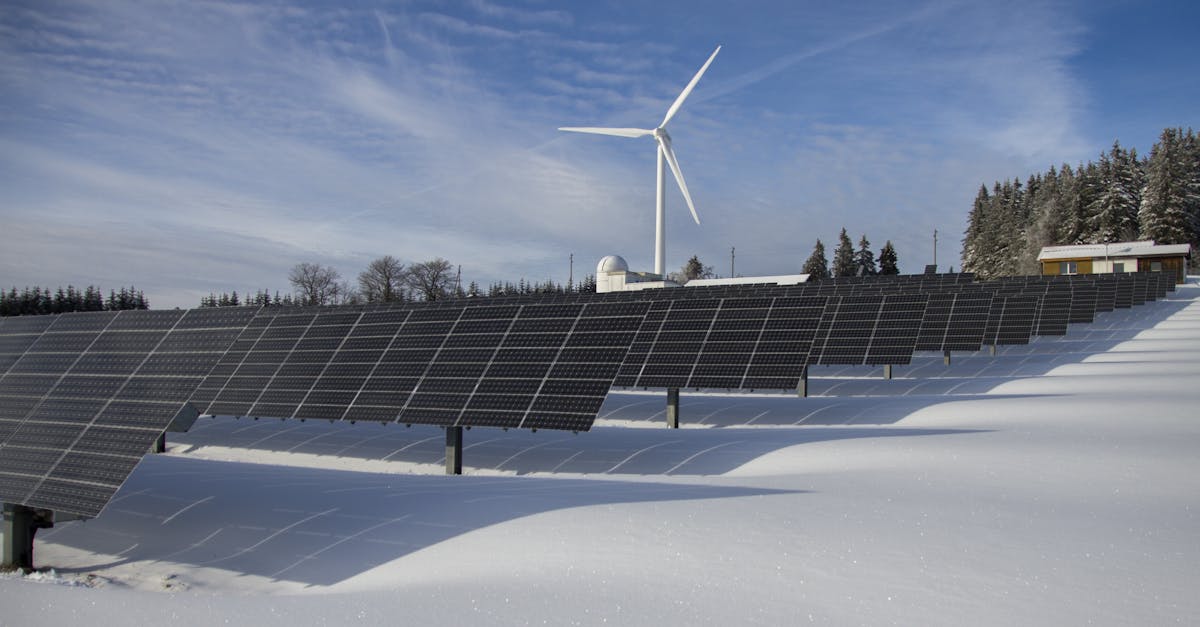
Why Invest in Solar Thermal Solutions
Environmental Impact Assessmentsissues from escalating into costly repairs. Routine checks should include inspecting for leaks, cleaning the collectors to remove dust and debris, and verifying that the fluid levels in the system are correct. Additionally, monitoring the pressure and temperature readings can provide insights into the system's performance, allowing for timely interventions when necessary.How can I evaluate ecological considerations when choosing a wind energy policy?
User habits also impact overall efficiency. Adjusting the usage patterns to align with peak solar energy production hours can significantly enhance effectiveness. For instance, scheduling high-energy tasks, such as washing laundry or heating water, during sunny periods allows for better utilisation of the system’s output. Furthermore, educating all household members about energy usage and the functionality of the solar thermal system fosters a culture of energy efficiency.To evaluate ecological considerations, assess factors such as the impact on local wildlife, habitat disruption, and potential effects on local ecosystems. Consulting with environmental experts and reviewing previous case studies can provide valuable insights into the ecological implications of wind energy projects.
Comparison with Other Renewable Energy SourcesWhat types of financial incentives and support are available for wind energy projects?
Solar thermal solutions offer a distinct advantage when compared to other renewable energy technologies, such as solar photovoltaic (PV) systems and wind energy. These systems excel in efficiency for heating applications, which are often more energy-intensive than electrical generation. For scenarios such as domestic heating or industrial processes that require hot water, solar thermal systems can provide more direct and effective energy solutions. Moreover, these systems tend to have lower maintenance requirements and longer lifetimes, further enhancing their appeal for consumers seeking reliable energy sources.Financial incentives for wind energy projects often include grants, low-interest loans, and tax credits. These incentives can significantly reduce the overall cost of development and operation, making wind energy more financially viable for investors and developers.
In contrast, solar PV systems convert sunlight into electricity, which can then be used for various applications. While this flexibility enables grid connectivity and energy storage options, it may fall short in meeting heating demands as effectively as solar thermal. Wind energy, although a powerful renewable option, depends heavily on site conditions and is less predictable. The energy output from solar thermal remains consistent across varying weather conditions when sufficient sunlight is available. This reliability makes solar thermal a compelling choice for those prioritising stability in their renewable energy investment.How do grants, loans, and tax credits work in the context of wind energy?
Advantages Over Solar PV and WindGrants are funds provided that do not need to be repaid, whereas loans are borrowed amounts that must be paid back with interest. Tax credits reduce the amount of tax owed, effectively lowering the project’s overall financial burden. Each of these incentives can encourage investment in wind energy by enhancing the economic feasibility of projects.
Solar thermal systems offer distinct advantages that cater to specific energy needs. They excel in providing consistent heat, making them ideal for applications like space heating and domestic hot water. Unlike solar photovoltaic (PV) systems, which convert sunlight directly into electricity, solar thermal technology harnesses solar energy specifically for heat production. This focus allows for greater efficiency in thermal energy applications, translating to lower energy costs in households and businesses that rely heavily on heating.What is grid integration and why is it crucial for wind energy?
When comparing solar thermal solutions to wind energy, the stability of energy generation emerges as a significant benefit. Solar thermal systems can operate effectively in a wider range of weather conditions. Their performance is less affected by variability in wind speeds, which can significantly impact the reliability of wind energy generation. Moreover, rural and urban areas alike can utilise solar thermal systems without requiring large land spaces typically associated with wind farms, making them more versatile for different settings.Grid integration refers to the process of connecting wind energy systems to the existing electricity grid in a way that ensures reliability and stability. It is crucial because it enables the efficient distribution of wind-generated electricity, maximises its use, and minimises disruptions to the energy supply. Enhancing energy transmission networks is key to successful grid integration.
FAQS
What are solar thermal solutions?Related Links
Solar thermal solutions use sunlight to generate heat, which can then be used for various applications such as heating water, space heating, and even powering certain industrial processes.How to Develop a Successful Wind Farm
How do I choose the right solar thermal system for my needs?Roundup of the Best Practices in Wind Farm Development
Consider factors such as your energy requirements, the size of your property, local climate conditions, and budget. It's also important to consult with a professional who can help assess your specific situation.Review of Current Wind Energy Policies in the UK